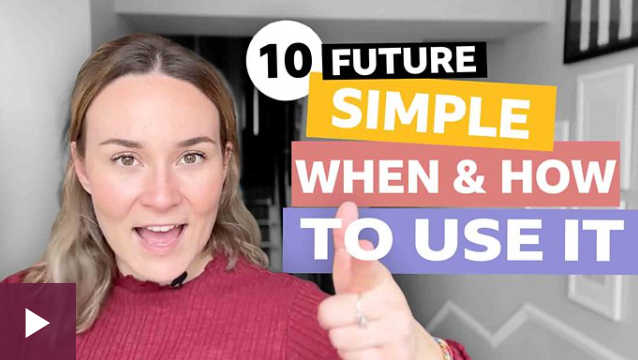USES OF FUTURE SIMPLE
To predict a future event. We’re often not 100% sure about it. (Compare this with ‘going to’ which is usually used for predictions based on evidence)
- I don’t think Ruben and Sam will get married. Maybe I’m wrong.
- I’m pretty sure my favourite team will win the match.
For a promise or to offer to do something for someone.
- I’ll help you with your homework after dinner.
- We’ll wait for you outside. Don’t worry, we won’t go without you!
For a spontaneous decision.
- I just heard the doorbell. I’ll go and see who it is.
- I’ll have a lemonade, please.
In a first conditional sentence when we think a future situation is real or possible.
- If I’m tired later, I’ll go to sleep early.
- My dog will come to the kitchen if he smells food.
STRUCTURE
For positive sentences, use the auxiliary verb ‘will’ before the main verb in its basic form. We often contract the form with an apostrophe.
- I will walk > I‘ll walk
- You will walk > You‘ll walk
- He will walk > He‘ll walk
- She will walk > She‘ll walk
- It will walk > It‘ll walk
- We will walk > We‘ll walk
- They will walk > They‘ll walk
For negative sentences, add ‘not’ after ‘will’. We usually contract the form with an apostrophe.
- I will not walk > I won’t walk
- You will not walk > You won’t walk
- He will not walk > He won’t walk
- She will not walk > She won’t walk
- It will not walk > It won’t walk
- We will not walk > We won’t walk
- They will not walk > They won’t walk
To ask questions, change the order of the sentence, so that ‘will’ is at the beginning.
- Will I walk?
- Yes, you will
- No, you won’t
- Will you walk?
- Yes, I will
- No, I won’t
- Will he walk?
- Yes, he will
- No, he won’t
- Will she walk?
- Yes, she will
- No, she won’t
- Will it walk?
- Yes, it will
- No, it won’t
- Will we walk?
- Yes, we will
- No, we won’t
- Will they walk?
- Yes, they will
- No, they won’t
To ask for more information, add the ‘who, what, where, why, how, when’ question words at the beginning.
- Why will I walk?
- Who will you walk with?
- Where will she walk?
- When will she walk?
- How will they walk?
